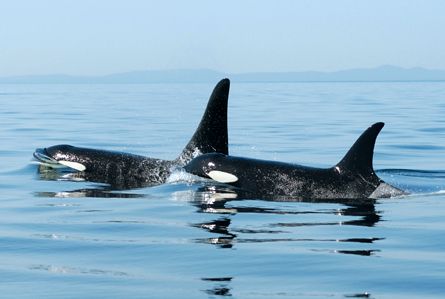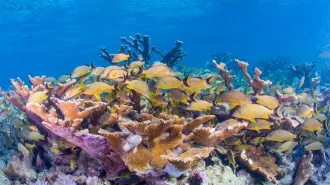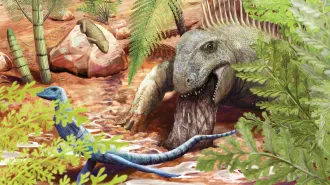Male killer whale thirtysomethings appear to live longer when mom’s nearby, especially if mom has stopped reproducing. This survival bonus for mama’s boys could be the first evidence from nonhuman animals for an evolutionary advantage to living long after reproduction stops.

In the Pacific Northwest, a male killer whale’s risk of disappearing, presumably from dying, seems to jump almost 14-fold if he’s older than 30 and his post-reproductive mom dies, says marine biologist Emma Foster of the University of Exeter in England. Daughters get a more modest fivefold boost, Foster and her colleagues report in the Sept. 14 Science.
Both sons and daughters typically spend their lives swimming with mom and other maternal relatives. Even though a female killer whale may stop having babies in her 30s or 40s, she can live into her 90s.
Males typically don’t live as long, but they can keep siring offspring throughout their lives. Keeping sons alive as long as possible should therefore maximize the chances that the mom’s genes will be carried into further generations. So, Foster says, the whale survival boost may help explain how female killer whales have evolved the longest post-reproductive life span known among nonhuman animals.
“Menopause is still one of the great mysteries of biology,” Foster says. Evolution works as genes for traits multiply through greater numbers of offspring, so what drives the evolution of a no-babies phase of adulthood has been a puzzle. Some theorists have argued that this post-reproductive life span is just a side effect of other survival-boosting traits, but other biologists have searched for some benefit in staying alive post-baby-bearing. The evidence is “quite heavily debated,” as Foster puts it.
Foster and her colleagues analyzed whale-spotting censuses that have been running since 1974 off the coast of Washington state and British Columbia. Each year, volunteers photograph the resident killer whales feasting on the salmon runs there and identify individuals known from the quirks of their fins and saddle markings. By 2010, these data included records of 589 individuals, including 297 that had disappeared and thus were presumed dead.
Foster and colleagues then calculated how mom’s presence or absence affected her offspring’s likelihood of death. Losing a mother had a bigger effect on sons older than 30. Whales in their 30s certainly no longer suckle mommy’s milk, but Foster speculates that the mother might provide other kinds of life-lengthening guidance for foraging or some support in a fight.
“The results of this study, if interpreted correctly, are quite surprising,” says Craig Packer of the University of Minnesota, Twin Cities. A big benefit to sons would be remarkable, he says, but a much simpler explanation would be that sons had disappeared because they swam off somewhere else after their mothers died.
Foster objects that this is unlikely because the whales in the region are tightly tied to the salmon runs and not likely to move where people wouldn’t spot them. To resolve this, Packer calls for radio-tagging as many killer whales as possible.
In his own analysis of lions and baboons, Packer and his colleagues found no evidence that older females increase the likelihood of their adult offsprings’ survival or reproductive success. Reproduction tapers off in these species as females age. Yet Packer says their post-reproductive phases just reflect the timescales in which a young cub would die without its mother’s care.






